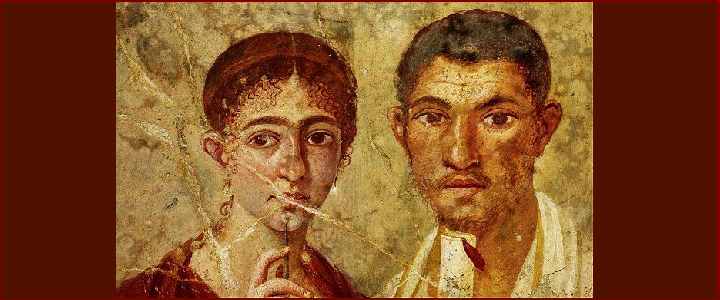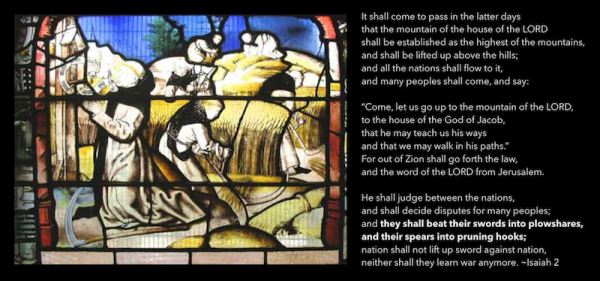
• “I serve Jesus Christ the eternal King. I will no longer serve your emperors. It is not right for a Christian to serve the armies of this world.” ~ Marcellus the Centurion, 298AD, spoken as he gave up his post in the army of Emperor Diocletian because of his faith.
• “We ourselves were well conversant with war, murder and everything evil, but all of us throughout the whole wide earth have traded in our weapons of war. We have exchanged our swords for plowshares, our spears for farm tools…now we cultivate the fear of God, justice, kindness, faith, and the expectation of the future given us through the Crucified One….The more we are persecuted and martyred, the more do others in ever increasing numbers become believers.” ~ Justin the Martyr (100AD – 165AD)
• “Murder, considered a crime when people commit it singly, is transformed into a virtue when they do it en masse.”
~ St. Cyprian (200AD – 258AD)
• “We who formerly hated and murdered one another now live together and share the same table. We pray for our enemies and try to win those who hate us.”
~ Justin the Martyr (100AD – 165AD)
• “It is absolutely forbidden to repay evil with evil.”~ Tertullian (160AD – 220AD
• “To those who ask us whence we have come or whom we have for a leader, we say that we have come in accordance with the counsels of Jesus to cut down our warlike and arrogant swords of argument into ploughshares, and we convert into sickles the spears we formerly used in fighting. For we no longer take ‘sword against a nation,’ nor do we learn ‘any more to make war,’ having become sons of peace for the sake of Jesus, who is our leader, instead of following the ancestral customs in which we were strangers to the covenants.”
~ Origen (185AD – 254AD)
• “Hitherto I have served you as a soldier; allow me now to become a soldier to God. Let the man who is to serve you receive your donative. I am a soldier of Christ; it is not permissible for me to fight.” ~ Martin of Tours (315AD – 397AD)
• “Christians, instead of arming themselves with swords, extend their hands in prayer.”
~ Athanasius of Alexandria (293AD – 373AD)
• The Christian poor are “an army without weapons, without war, without bloodshed, without anger, without defilement.” ~ Clement of Alexandria (150AD – 214AD)
• “I do not wish to be a ruler. I do not strive for wealth. I refuse offices connected with military command.” ~ Tatian of Assyria (died around 185AD)
• “Above all Christians are not allowed to correct by violence sinful wrongdoings.”
~ Clement of Alexandria (150AD – 214AD)
• “The Christian does not hurt even his enemy.”~ Tertullian (160AD – 220AD)
• “None of us offers resistance when he is seized, or avenges himself for your unjust violence, although our people are numerous and plentiful…it is not lawful for us to hate, and so we please God more when we render no requital for injury…we repay your hatred with kindness.”
~ St. Cyprian, Bishop of Carthage (died 258AD)
• “We Christians are a peaceful race…for it is not in war, but in peace, that we are trained.”
~ Clement of Alexandria (150AD – 214AD)
• “Only without the sword can the Christian wage war: the Lord has abolished the sword.” ~ Tertullian (160AD – 220AD)
• “You cannot demand military service of Christians any more than you can of priests. We do not go forth as soldiers with the Emperor even if he demands this.”
~ Origen (185AD – 254AD)
• “We who formerly treasured money and possessions more than anything else now hand over everything we have to a treasury for all and share it with everyone who needs it. We who formerly hated and murdered one another now live together and share the same table. We pray for our enemies and try to win those who hate us.”
~ Justin the Martyr (100AD – 165AD)
• “For what war should we not be fit and eager, even though unequal in numbers, we who are so willing to be slaughtered—if, according to that discipline of ours, it was not more lawful to be slain than to slay?”~ Tertullian (160AD – 220AD)
• “The professions and trades of those who are going to be accepted into the community must be examined. The nature and type of each must be established… brothel, sculptors of idols, charioteer, athlete, gladiator…give it up or be rejected. A military constable must be forbidden to kill, neither may he swear; if he is not willing to follow these instructions, he must be rejected. A proconsul or magistrate who wears the purple and governs by the sword shall give it up or be rejected. Anyone taking or already baptized who wants to become a soldier shall be sent away, for he has despised God.”
~ Hippolytus (170AD – 236AD)
• “Christ, in disarming Peter, disarmed every soldier.” ~ Tertullian (160AD – 220AD)
• Christians “love all people, and are persecuted by all;…they are reviled, and they bless; they are insulted, and are respectful.”~ Epistle of Mathetes to Diognetus (late 2nd Century)
• “Say to those that hate and curse you, You are our brothers!” ~ Theophilus of Antioch (died around 185AD)
• “For the Gentiles, hearing from our mouth the words of God, are impressed by their beauty and greatness: then, learning that our works are not worthy of the things we say, they turn to railing, saying that it is some deceitful tale. For when they hear from us that God says: ‘No thanks will be due to you, if ye love only those who love you; but thanks will be due to you, if ye love your enemies and those that hate you’—when they hear this, they are impressed by the overplus of goodness: but when they see that we do not love, not only those who hate us, but even those who love us, they laugh at us, and the Name is blasphemed.”
~ The 2nd Epistle of Clement (140-160AD)
• “Shall it be held lawful to make an occupation of the sword, when the Lord proclaims that he who uses the sword shall perish by the sword? And shall the son of peace take part in the battle when it does not become him even to sue at law?”
~ Tertullian (160AD – 220AD)
• “It is the Christians, O Emperor, who have sought and found the truth, for they acknowledge God…. They show love to their neighbors. They do not do to another what they would not wish to have done to themselves. They speak gently to those who oppress them, and in this way they make them their friends. It has become their passion to do good to their enemies…. This, O Emperor, is the rule of life of the Christians, and this is their manner of life.”
~ Aristides (written around 137AD)
• “We Christians cannot endure to see a man being put to death, even justly.”~ Athenagoras (133AD – 190AD)
• “Learn about the incorruptible King, and know his heroes who never inflict slaughter on the peoples.” ~ Tertullian (160AD – 220AD)
• “Christians appeal to those who wrong them and make them friendly to themselves; they are eager to do good to their enemies; they are mild and conciliatory.”
~ Aristides of Athens (2nd Century)
• “I recognize no empire of this present age.” ~ Speratus (martyred 180AD)
• “For when God forbids us to kill, he not only prohibits us from open violence, which is not even allowed by the public laws, but he warns us against the commission of those beings which are esteemed lawful among men….Therefore, with regard to this precept of God, there ought to be no exception at all, but that it is always unlawful to put to death a man, whom God willed to be a sacred animal.” ~ Lactantius, instructor of Constantine’s son (240AD – 320AD)
• “Shall we carry a flag? It is a rival to Christ.” ~ Tertullian (160AD – 220AD)
• “I am a Christian. He who answers thus has declared everything at once—his country, profession, family; the believer belongs to no city on earth but to the heavenly Jerusalem.” ~ St. John Chrysostom (347AD – 407AD)
• “If anyone be a soldier or in authority, let him be taught not to oppress or to kill or to rob, or to be angry or to rage and afflict anyone. But let those rations suffice him which are given to him. But if they wish to be baptized in the Lord, let them cease from military service or from the [post of] authority, and if not let them not be received. Let a catechumen or a believer of the people, if he desire to be a soldier, either cease from his intention, or if not let him be rejected. For he hath despised God by his thought, and leaving the things of the Spirit, he hath perfected himself in the flesh and hath treated the faith with contempt.” ~ The Testament of Our Lord (4th or 5th Century AD document)
• “We have become sons of peace for the sake of Jesus, who is our leader.” ~ Origen (185AD – 254AD)
• “If you enroll as one of God’s people, then heaven is your country and God your lawgiver.” ~ Clement of Alexandria (150AD – 214AD)
• “God called Abraham and commanded him to go out from the country where he was living. With this call God has roused us all, and now we have left the state. We have renounced all the things the world offers…. The gods of the nations are demons.”
~ Justin the Martyr (100AD – 165AD)
• “But now inquiry is being made concerning these issues. First, can any believer enlist in the military? Second, can any soldier, even those of the rank and file or lesser grades who neither engage in pagan sacrifices nor capital punishment, be admitted into the church? No on both counts—for there is no agreement between the divine sacrament and the human sacrament, the standard of Christ and the standard of the devil, the camp of light and the camp of darkness. One soul cannot serve two masters—God and Caesar…But how will a Christian engage in war (indeed, how will a Christian even engage in military service during peacetime) without the sword, which the Lord has taken away?”
~ Tertullian (160AD – 220AD)
• “This is the way of life: first, thou shalt love the God who made thee, secondly, thy neighbor as thyself: and all things whatsoever thou wouldest not should happen to thee, do not thou to another. The teaching of these words is this: Bless those who curse you, and pray for your enemies, and fast on behalf of those who persecute you: for what thanks will be due to you, if ye love only those who love you? Do not the Gentiles also do the same? But love ye those who hate you, and ye shall not have an enemy.”
~ The Didache, also known as The Teachings of the 12 Apostles, is an early Christian document written between 80AD – 90AD.
Sources:
40 Early Church Quotes



